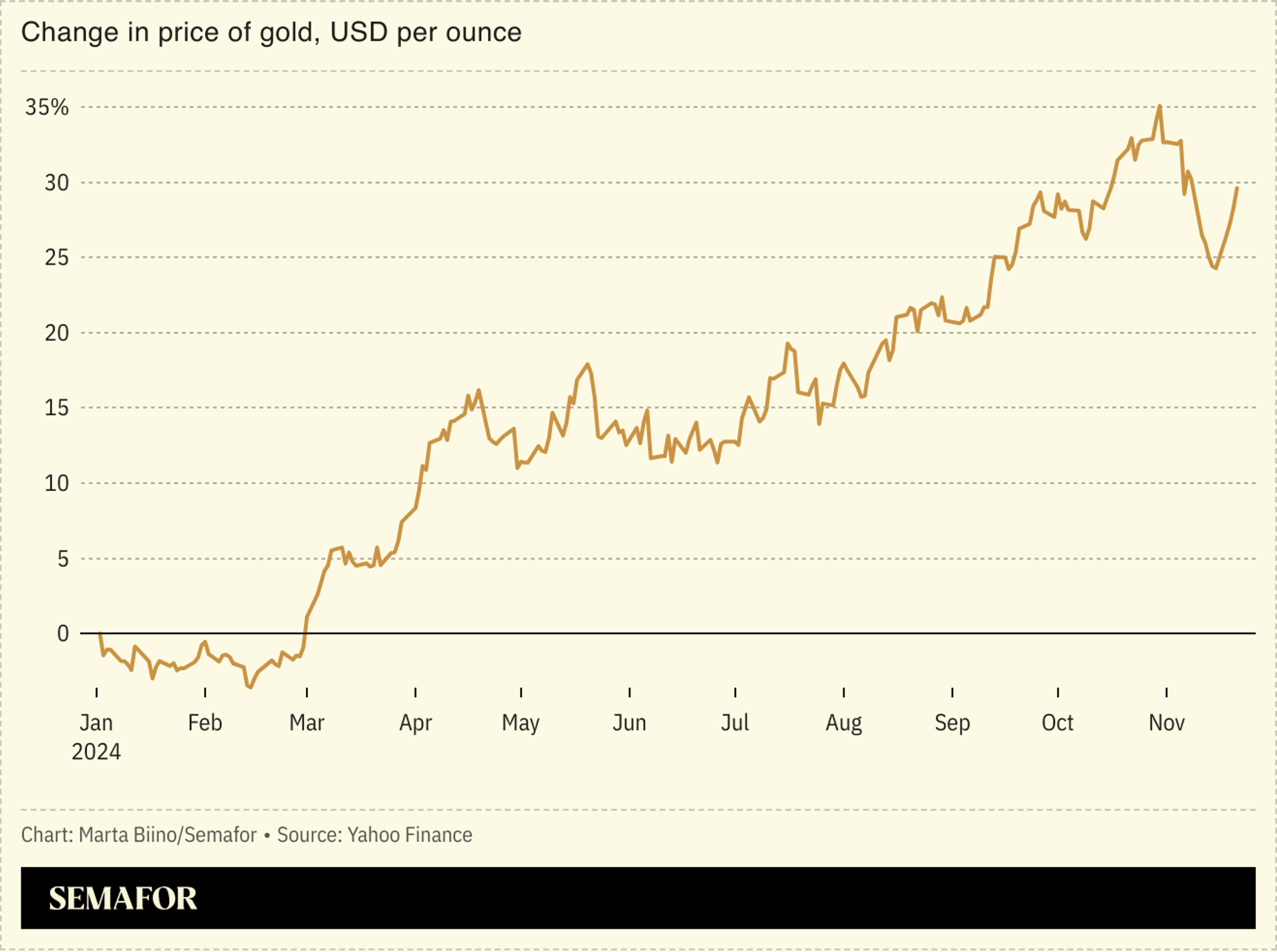The News
ACCRA, Ghana — A surge in illegal mining that has reduced Ghana’s cocoa production, contaminated water supplies, and stoked food inflation looks set to be among the biggest challenges awaiting the winner of next month’s presidential election.
Illegal gold mining, known locally as “galamsey,” has spread across Ghana this year, driven by a historic rise in global gold prices. But, with much of the gold smuggled out of the country, Africa’s top gold exporter isn’t benefiting from the boom.
The illegal miners typically dig in makeshift pits. They use chemicals, such as mercury and nitric acid, to separate gold particles from sediment before dumping their waste in rivers. Chinese entrepreneurs have driven much of the recent surge by partnering with local leaders and, in some cases, providing sophisticated digging machinery.
Unlicensed miners are encroaching on farmland which analysts say has contributed to the sharp fall in the production of cocoa, one of Ghana’s main exports. Output for the 2023/24 season in the world’s second largest cocoa producer is projected to be nearly 40% lower than the industry target — a problem partly due to climate change and crop disease, but exacerbated by gold mining.
The Ghana Water Company in August warned that parts of the country faced water shortages due to pollution caused by illegal mining. That warning spurred hundreds of campaigners to stage street protests in a bid to make galamsey a campaign issue ahead of the Dec. 7 presidential election.
Illegal mining in Ghana has gone on for decades, but the trade in illegally mined gold has now become lucrative for entire communities and political elites.
“A lot of the money is being used to support political parties,” said Kweku Awotwi, a Ghanaian executive who chairs the board at United Bank for Africa (Ghana). “It’s very profitable to be in the business and a lot of people are benefitting from it.”
Know More
The two main presidential candidates — Mahamudu Bawumia of the governing New Patriotic Party (NPP) and main opposition leader John Dramani Mahama of the National Democratic Congress (NDC) have vowed to crack down on galamsey.
Bawumia, in his manifesto, said an NPP government would create a minerals development bank to finance local mining projects and simplify the licensing of small-scale mining businesses.
Mahama has vowed to establish a gold board to improve the regulation of the mining sector and roll out a project to convert galamsey sites into agricultural land.
Alexis’s view

Ghana’s illegal mining frenzy is damaging the country’s economy in many ways.
The skyrocketing demand for gold is clear. Small-scale mines produced 1.2 million ounces of gold in the first seven months of 2024, more than in the whole of 2023, according to Ghana’s mining sector regulator. But most of that galamsey gold is smuggled out of the country and therefore doesn’t contribute to export revenues.
And it’s hitting other parts of the economy, most notably agriculture — although it’s hard to tell the full impact on cocoa production because the crop has also been hit by an outbreak of black pod disease.
Ghana will have a new president after next month’s election, with the incumbent Nana Akufo-Addo standing down after serving two four-year terms. That person will need to revive the economy in a country that is trying to claw its way out of the worst economic crisis in a generation, following a debt default two years ago.
Illegal mining threatens to prolong the crisis, but there’s little incentive for the next government to crack down on galamsey because it funds political machines and enriches traditional rulers.
Galamsey provides many forms of employment; from those digging for precious metals, to drivers, and makeshift security guards. A new government could turn this to its advantage if it finds a way to formalize these unlicensed small-scale mines.
That would capture revenue in the formal economy and improve safety standards. It could also offer a template for other African countries facing similar challenges.
Room for Disagreement
Seth Twum-Akwaboah, CEO of the Association of Ghana Industries (AGI) trade body, played down the impact of illegal mining on Ghana’s economy. He said the main issue causing concern for AGI’s more than 1,000 members was the depreciation of the cedi currency, which has lost around 25% of its value since the start of the year, combined with high inflation.
He described that as a “major issue” since it reduces consumer purchasing power, whereas galamsey was not having an “immediate, direct effect” on AGI’s members. “But we can all foresee that, if it continues, in the future it is going to be a big problem.”
The View From A Political economist
The spread of galamsey threatens the land base used for Ghana’s main exports and is cutting local food production, said one analyst. “We’re already not producing enough food for ourselves and relying on imports to feed our people,” said Mavis Owusu-Gyamfi, CEO of the African Center for Economic Transformation (ACET) think tank.
The impact of galamsey is “huge economically, socially, and environmentally,” said Owusu-Gyamfi, who said farmers had complained of mercury poisoning their land and cited recent research findings that found chronic health problems and birth defects in areas where illegal mining is prevalent.
